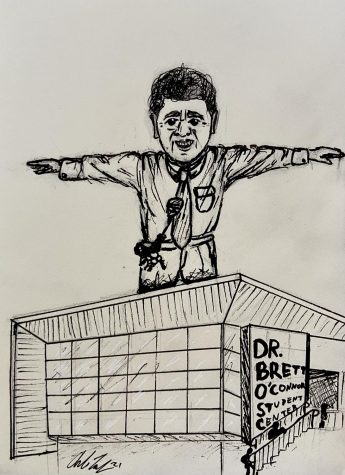Of covid and companies: America’s vaccine rollout hinges on corporate mandates
The consensus is clear: there is hope at last. Multiple pharmaceutical companies have developed vaccines for COVID-19, and millions of people across the United States have rejoiced upon hearing the news. The months upon months of deaths upon deaths due will eventually end once the country and the world become inoculated with the vaccine. The months between now and that point in time will be some of the darkest yet, but this news lends us strength amidst the eye of the storm.
Unfortunately, “consensus” may have been a bit of a strong term to use. A study by the Pew Research Center that was published on December 3, 2020, found that only about 60 percent of Americans would probably or definitely get a coronavirus vaccine. Those numbers are deeply saddening. According to the CDC, it is still unknown exactly what percentage of the population needs to be immunized in order to quell the spread of COVID-19 and return to normal, but based on the transmissibility of the virus, 60 percent is likely not enough. However, these numbers still remain nebulous. The amount of people willing to take the vaccine has been in flux since the “new normal” began in mid-March, and most importantly, approximately half of the people who fall into the 40% of those not willing to take the vaccine say that they would be willing to take it “once there is more information.” While this viewpoint still errs on the side of irresponsibility as thousands more people will die due to a lack of widespread vaccination, it provides a critical insight into the minds of those not willing to take the virus. It shows that a good portion of people are willing to take the virus, but need a little push in the right direction. As such, the effectiveness of a COVID-19 vaccine rollout relies on schools and workplaces mandating vaccines, especially considering the general unlikelihood of a government vaccine mandate.
It is a distinct possibility that many of the people who have reservations about coronavirus vaccines right now can easily be motivated to take it if they have a strong incentive to do so, like not being able to work if they don’t have the vaccine. Per the Equal Employment Opportunity Commission, companies have the ability to mandate vaccines within their workforce, with one of the primary examples of this coming with the flu vaccine. Considering that corporate vaccine mandates are legal and that the coronavirus is even more deadly than the flu, companies who wish to establish a vaccine mandate will have a good precedent with which to justify their vaccine mandate. There most certainly will be pushback, but considering the sheer power of corporate America, the amount of wiggle room for vaccine dissidents is very limited. In fact, the only exemptions to a company’s vaccine mandate are exemptions for medical reasons under the Americans with Disabilities Act (ADA) and for religious reasons under Title VII of the 1964 CIvil Rights Act. With these exemptions aside, the vast majority of the American workforce, especially those who work for large corporations or their subsidiaries, will get vaccinated. This will hopefully cause a large spike in vaccination numbers.
This stands in stark contrast with what the government would be able to accomplish. The American public has grown weary of the government’s public health response over the course of the pandemic as mixed messaging from political parties and organizations such as the CDC has created confusion and mistrust. Furthermore, the government’s reach simply does not impact the day-to-day life of the average American in the same way as a company does. Over 108 million Americans work in the private sector and their money flows from the hands of their higher-ups. The bottom line is this: companies do have the leeway to mandate vaccines and they do have more authority over the daily lives of the American people than the government. Therefore, it is of tantamount importance for the sake of the economy and the livelihoods of the American people that corporate America makes the right choice on vaccine mandates.
The fact that America has been forced to reckon with who can force people to take medicine that will save the lives of themselves and their loved ones is deeply saddening. It reflects a larger culture of vaccine skepticism that threatens not only the very bedrock of the nation’s public health system, but the lives of those most vulnerable to the coronavirus. As the anti-vaxx movement sinks its claws further and further into the fabric of society, the COVID-19 rollout can provide a turning point in the war against disinformation, but for that moment to happen, companies must vaccinate their workers.
Hello there! Our goal is to provide relavent, engaging journalism for readers of all ages. Your donation will support the student journalists of the Wolfpacket at Claremont High School, and will allow us to purchase equipment, print our monthly issues, and enter in journalism competitions. We appreciate your consideration!

Charlie Warren is a senior at Claremont High School, where he is currently an assistant sports editor with the Wolfpacket. In terms of extracurriculars,...





